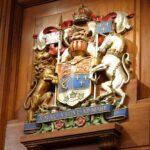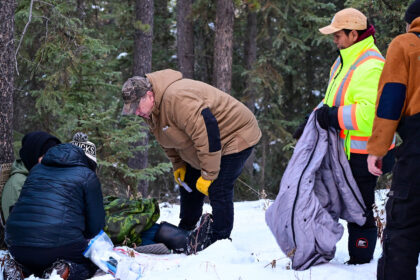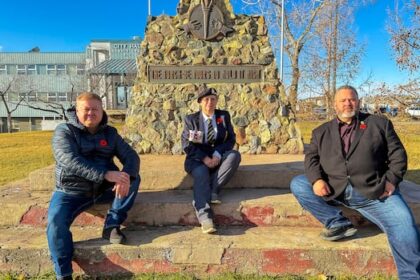Thirty-three years is a long time in any field, but in the world of politics, it’s an eternity. When Ghislain Picard took office as Regional Chief of the Assembly of First Nations Quebec-Labrador (AFNQL) in 1992, Brian Mulroney was Prime Minister. The AFNQL is less than ten years old, the Kanesatake siege (Oka Crisis) is a recent and traumatic memory, and the Royal Commission on Aboriginal Peoples has just been created. The Cree Nation of Eeyou Istchee and the Inuit of Nunavik were collaborating in a series of protests that would ultimately derail Hydro-Québec’s Grande-Baleine hydroelectric development project. “In 1992, I probably would have been the last person to believe that I would still be chief of the AFNQL 33 years later,” Picard said in a Face to Face interview—the first in French—with APTN’s Kim Sullivan. “Because it wasn’t, in my mind, a career. It was a mission. With a beginning and an end.” Born in the Innu community of Pessamit, on the north shore of the St. Lawrence, Picard grew up speaking Innu-aimun at home and learned French at school. Although shy, he says he drew on the assertive talents of the entire community. “Yes, obviously, being a minority, and this is what I still see today, several decades later, is that we tend to assert ourselves more,” says Picard. Quiet assertion became Picard’s signature during his years as regional chief. Growing up in the context of the fight against Quebec’s first wave of hydroelectric development in the Cree Nation east of James Bay, he said he always understood that Indigenous leadership was based on the need to assert territory, title, history, and culture. But even that, he stressed, “challenges a person and puts a person in front of choices that are not always obvious.” As the leader of ten First Nations in a territory three times the size of France, Picard says he has made an effort to listen and understand the specific needs and opinions of the people, as well as the contrasts that exist between them. He doesn’t hesitate to dismiss the idea that responding to 43 chiefs across Quebec and Labrador was an onerous task, instead calling it a huge privilege. After all, he says, it’s challenges that inspire him. “Where the challenge is interesting, and for me, the more challenge there was, the more interesting I found it, is really to make a whole with this great diversity. When we say that it is diversity that makes us strong, I have seen it every time the leaders meet,” he declared. “My role is to determine what the whole has in common, put that on the table and invite discussion.” Open dialogue has been one of the pillars of Picard’s leadership at the AFNQL, based on his belief that the ten geographically disparate First Nations of Quebec-Labrador are best served when each clearly understands the needs and priorities of the other. “I’ve always found that our communities have been—this is, I would say, the legacy of colonization—always a little withdrawn, with difficulty expressing opinions,” he explains. “And that was intentional. So, we had to relearn how to listen, to speak, and to form an opinion on issues that, ultimately, were part of our daily lives. So, yes, I think that in some way, that shaped the person I became as a regional chief.” After each election, he remembers taking stock of himself to assess his health and his passion for the job. It took 11 elections, but it was this year that he decided to step down while still at the top. He had the energy and could have continued, but he felt the time was right, and he has no regrets. “It hasn’t happened often that I’ve hit a wall,” he said. “And for that, I really have to thank the leaders over the years. Those who are here today, those who have been here since 1992. And that’s what, I think, has greatly influenced the decisions I’ve had to make over the years.” But Picard’s work isn’t over. Earlier this month, he was in New York with a delegation of Quebec First Nations to ask the provincial government to respect the United Nations Declaration on the Rights of Indigenous Peoples. He hopes to be able to devote more time to his daughters and grandchildren, to whom he is very close. Although his social media profile reveals he is a prolific runner and cyclist, he hopes the distance from politics will allow him to get even fitter – perhaps fit enough to run his first marathon. But Ghislain Picard recognizes that he will never be far from politics. “We have no choice but to pay attention to the political environment in general, which we do not control or do not control as much as we would like,” he said. He remembers that a woman once asked him in Innu: “Ghislain, when will we get to where we want to be?” It’s a question he believes everyone should ask themselves to take stock of what they have accomplished and what they still have to achieve. “Self-determination is the goal we all share,” he said, “and we may have different opinions on how to get there. But at the same time, I think everyone really has their eye on the goal. It’s a goal that’s not off the radar, in my opinion.” “What I see, and this is why I want to remain active beyond my decision to leave, is that there is still a long way to go.” Continue Reading
Il reste encore beaucoup de chemin à parcourir : Ghislain Picard se penche sur ses 33 années à la tête de lAPNQL
Leave a Comment










